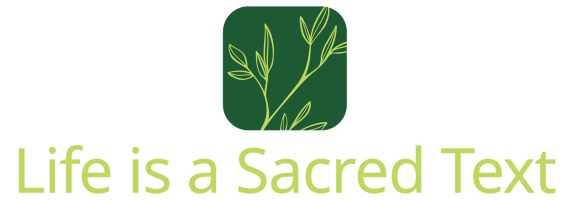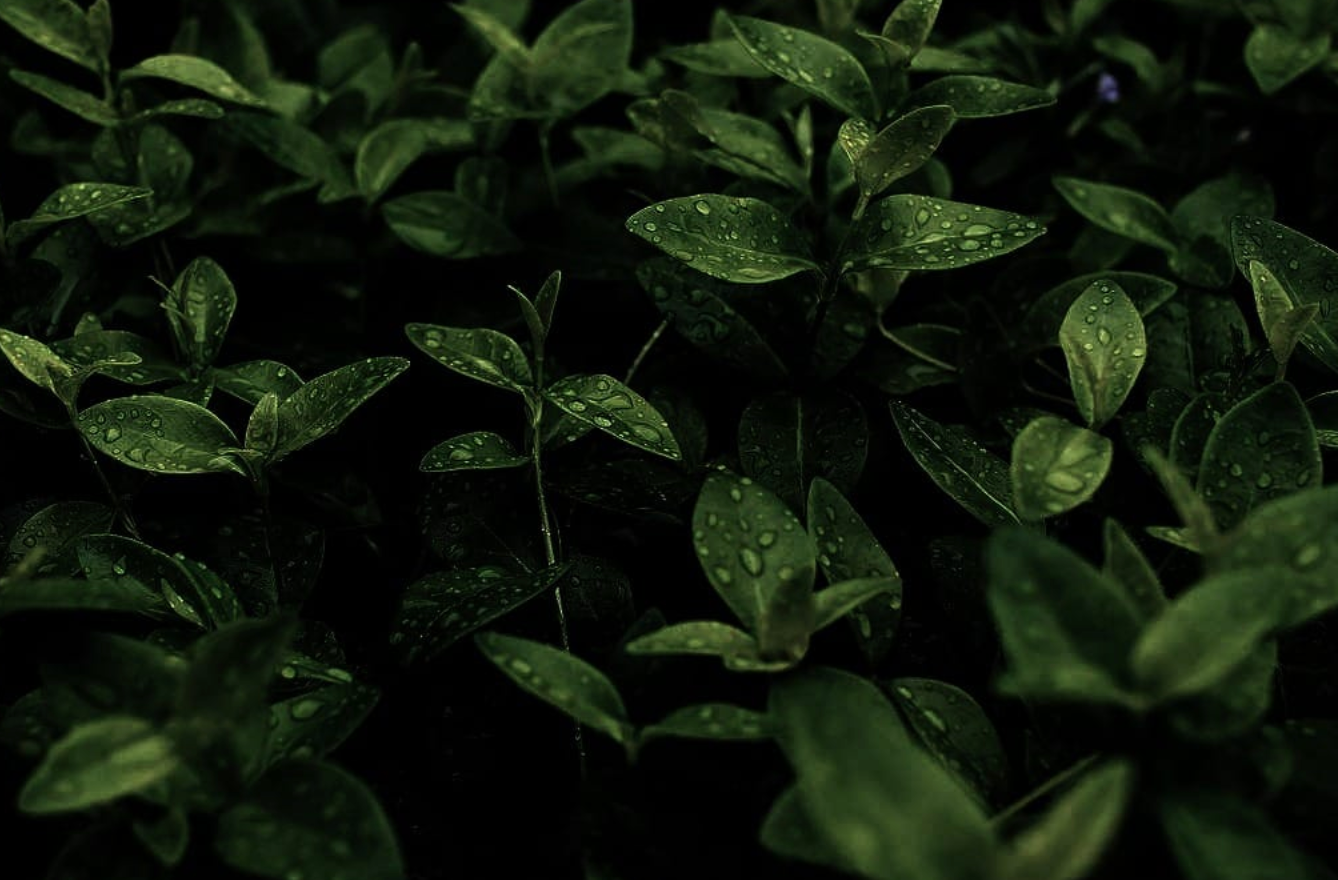"Are Jews Indigenous?" A Quechua Jew Weighs In
Guest Post from Daniel Delgado

This is Life as a Sacred Text 🌱, an everybody-celebrating, justice-centered voyage into ancient stories that can illuminate our own lives. It‘s run on a nonprofit, so it’s 100% NAZI FREE. More about the project here, and to subscribe, go here:
God spoke to Moses, saying, “Send agents to scout the land of Canaan, which I am giving to the Israelite people; send someone from each of their ancestral tribes, each one a chieftain among them.” (Numbers 13: 1-2)
Last week, as you may remember, the Israelites in our story returned to matters related to the Conquest Narrative. Before we move on from this moment, it feels important to directly address a question looming in the background of this whole conversation.
That is to say, over the years, and certainly plenty over the last six months, I've heard a number of Jews claim that Jews are Indigenous to the Land of Israel. (One can certainly understand how my conquest narrative piece might be implicitly suggesting that, though I carefully and intentionally make no such claim.)
I have always been uncomfortable with this, but had neither the tools to articulate why, nor, I believed, was I the right person to make such a case even if I did.
So, a while back, I wrote to the wonderful Daniel Delgado, an insightful Quechua and Jewish writer whose voice I've long admired. Was I off-base in my gut response to this? What was his take? Did he have thoughts that he'd be game to share?
Did he ever. This week, I'm delighted to offer this thoughtful guest post.
For some of you, this might feel especially emotionally charged. I ask that you please listen to his thoughtful words, and try to hear what he's saying– and get clear on what he's not saying, as well.
"Are Jews Indigenous?"
A Quechua Jew Weighs In
By Daniel Delgado
Often, when other Jews find out that I’m both Jewish and Native, and that I teach and write on colonialism and Indigenous identity, it turns out they have something on their minds.
“What do you think,” they ask me—hesitantly, as if afraid I might bite them (1)—“about the idea that Jews are an Indigenous people?”
The claim has cropped up increasingly over the past few years, especially in recent months and usually in its explicitly politicized form: “Jews are Indigenous to Israel.”
On the other hand, we also hear: “Palestinians are an Indigenous people.”
It’s a genuinely confusing and intimidating conversation, especially for those not well versed in the language of the global Indigenous peoples movement.
But it’s an important conversation to have, not least because this claim is currently being used to justify a campaign of unrelenting atrocity against Palestinians in Gaza and the West Bank. The answer also affects how Jews see ourselves in relation to other marginalized peoples, which in turn affects how we act toward them.
So it’s time to have the hard conversation:
To take a look at the ways in which Jewish and Indigenous cultures and experiences do share a lot in common, and to face the fact that conflating the two does real harm to many peoples who are struggling for survival.
This isn’t just a question of semantics or political correctness. As Ta-Nehisi Coates writes in Between the World and Me,
“You must always remember that the sociology, the history, the economics, the graphs, the charts, the regressions all land, with great violence, upon the body.”
So hear me out. Let’s talk it through.
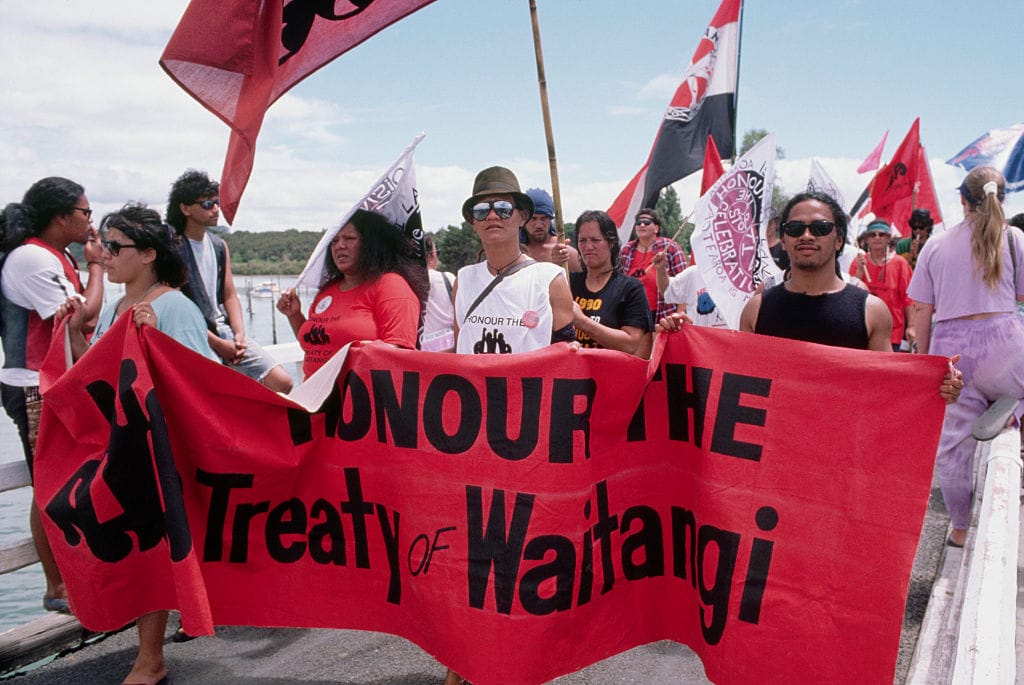
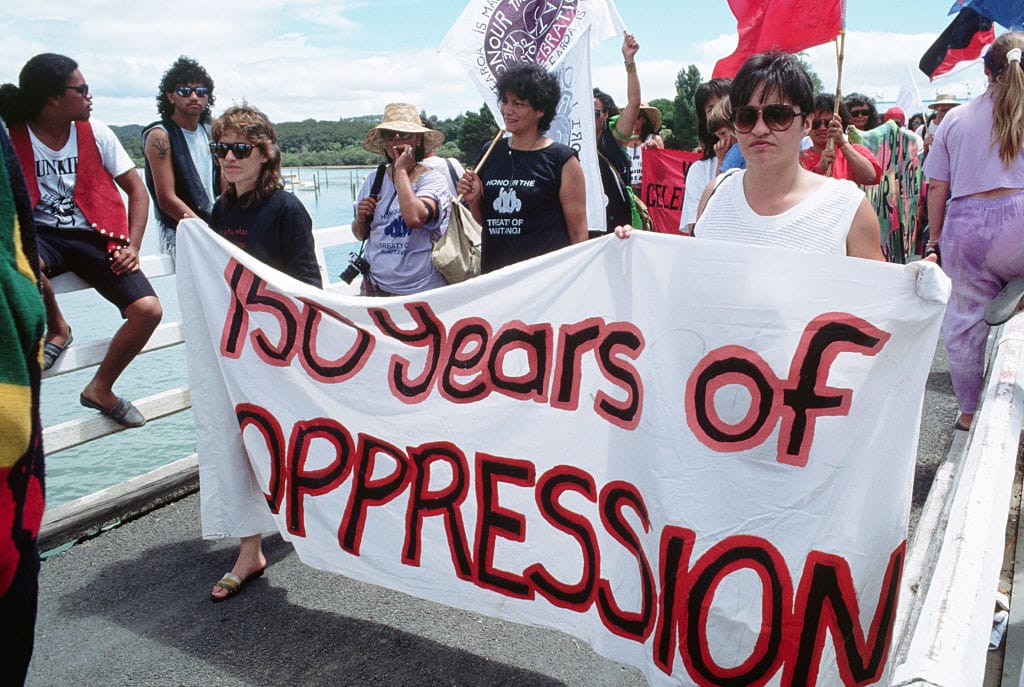
Protesters hold a rally in protest a visit of Queen Elizabeth to New Zealand. Their banners read "HONOUR THE TREATY of WAITANGI," & "150 YEARS OF OPPRESSION" referring to an 1840 "agreement" between the British Crown and Te Tangata Whenua I Aotearoa, often known as the Māori peoples of New Zealand, in which the former acknowledged the rights and land of the latter--but the British government insisted that it placed all Māori under British authority.
Starting at the Beginning
I write this not merely as a Quechua and an Ashkenazi Jew, a writer and a rabbinic student, but as someone who has spent my entire adult life engaged in movements for Indigenous sovereignty and survival. I have worked with other Indigenous peoples from North, Central, and South America on campaigns to protect our lands, our ways of life, and our planet. I have taught extensively on the topic of colonization as it exists today, including within explicitly Jewish frameworks.
It’s important for me to mention this, because there’s no single “Native” or “Native and Jewish” opinion on this or any other question (shocking, I know!). Given a few seconds online, you could certainly find a Native to quote who disagrees with me. So understand the place I am coming from, who my communities are. Who I am responsible to.
Let’s do a thought exercise. Take a moment and call up, in your mind, an image that represents for you an archetypal Indigenous person. Don’t worry, for now, about how this image is doubtless informed by racist stereotypes of one kind or another—the point is, you have a sense of what “Indigenous” feels like.
You could probably make a list of traits applicable both to this archetypal image and to an equally archetypal image of Jews: an ancient people, connected to a particular land, persecuted by European Christians, survivors of genocides, an ethnoreligion (2), a spiritual connection to the cycles of nature, a unique language and calendar….
These points of commonality were an important anchor for me as a bicultural child given very little context for making sense of my place in the world. So I’m not going to tell you they aren’t real. They’re among the things that make it—sometimes—quite comfortable for me to move between the Jewish and Native worlds.
But the hard fact is, this mental image is a stereotype, authored by colonialism. Being Indigenous isn’t about ceremonies with plants, or rain dances, or wearing our clothes or hair in a certain way. These clichéd images are designed to confine us to the roles assigned us by our oppressors, to keep us from claiming our place as modern peoples. We cannot, in the end, let ourselves be defined by those who have always sought to destroy us.
So let’s set aside those mental images and talk about the term “Indigenous” itself. Turning to our trusty Merriam-Webster’s, we immediately see two different definitions. No wonder it gets confusing!
Spelled with a lowercase i, “indigenous” usually means something like “originally from a certain place,” as in, “cactuses are indigenous to the Americas.” It’s the opposite of “introduced” or “foreign.”
This is not the definition we use for human beings or cultures. To make sense of that, we need to understand that “Indigenous”—always capitalized—is an intrinsically political term, created in response to colonization.
In a place that has never known colonization, there’s no need for a concept like “Indigenous.” Before the Europeans came to Abya Yala, we were simply “people.”
Then the colonizers invaded, destroyed our traditional governance structures, killed our people, stole our lands. In this part of the world, they called us “Indians” to distinguish us from them, and they made laws to codify our inferiority. “Indian” became a social and legal reality.
But “Indian” was a colonial term specific to the Americas. (3) In other places, colonizers used terms like “aboriginal” or “native,” along with a wide variety of (other) slurs.
The umbrella term “Indigenous peoples” was adopted by the nascent Indigenous peoples movement of the 1970s as an explicitly internationalist term to highlight the commonality of experience between disparate peoples around the world. It was also, in part, a radical act of self-naming meant to repudiate the othering implicit in received names like “Indian.”
That is, resistance to colonization was always part of the definition and the intent. This is part of why attempts at precise technical definitions like “the first people to live in a place” always fall short.
As Sámi scholar Troy Storfjell says,
“Indigeneity is an analytic, not an identity. … Indigeneity describes a certain set of relationships to colonialism, anticolonialism, and specific lands and places.”
Put another way: the onset of colonization creates the categories of Indigenous people and colonizers (or “settlers”). The persistence of colonial structures maintains them.
That’s why it’s pretty much only fascists who say things like “Germans are the Indigenous people of Germany.” The term is nonsensical in that context, and using it that way only detracts from the intent—and therefore potency—of the word.
It’s also important to note that within Indigenous and Decolonization studies, “colonialism” refers to particular systems of domination that emerged after 1491. Thus, as much as we might dislike what Antiochus IV did in Judea in the 160s BCE, this would not be properly referred to as colonialism, and there are no Indigenous people in the story. (4)
I can hear some of you complaining: “You still haven’t defined the word!”
You’re right, I haven’t. (5) Because definitions are a Eurocolonial concept based in reductionism; they attempt to restrict meaning. The most important concepts in life can never be strictly defined. Go ahead and try it: define “Jew” or “Jewish.”
Any attempt at definition flounders. But you can definitively point to some things and say, “That’s NOT Jewish.”
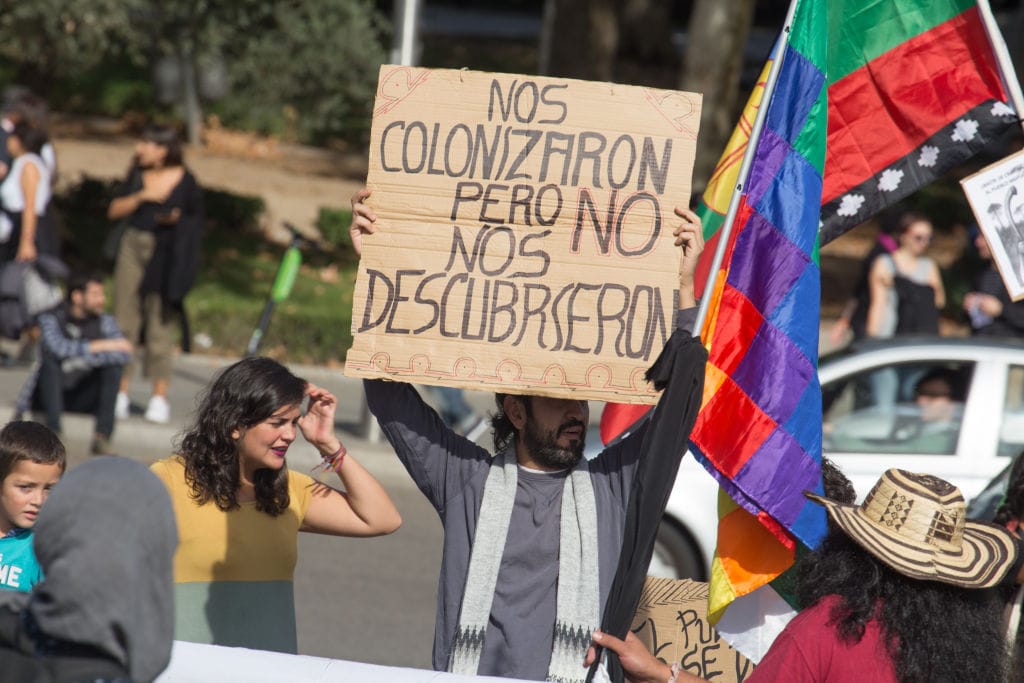
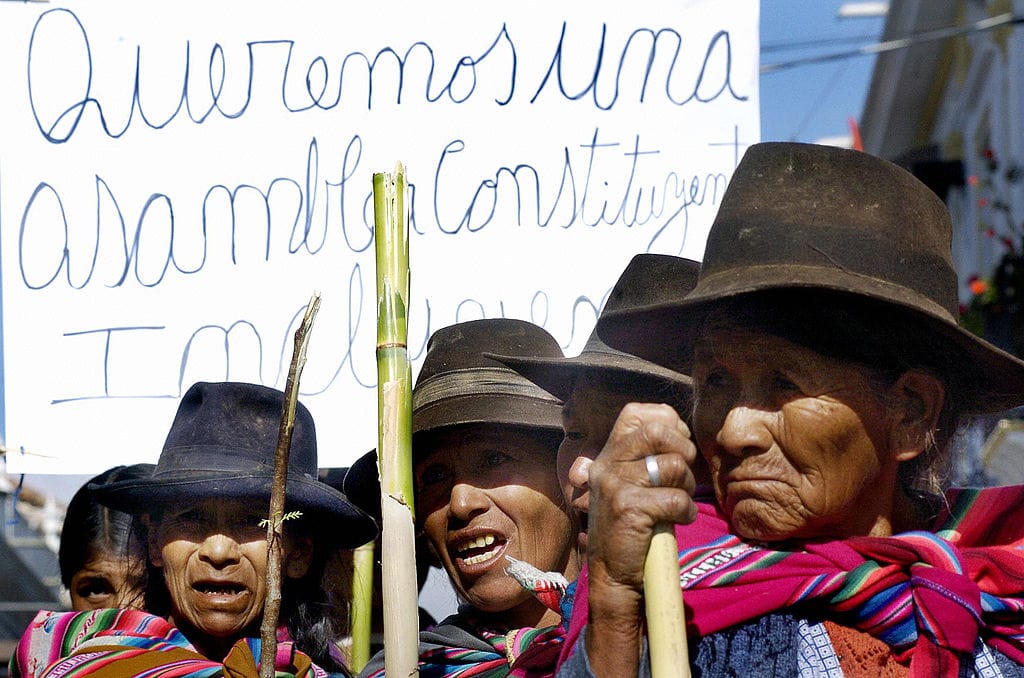
So … What About the Jews?
Now that we have a sense of what “Indigenous” means, we can examine Judaism and the Jewish people through this analytic.
Let’s start with Eretz Yisrael, the “Land of Israel” as imagined in our sacred texts. We’ll come back to this, but for now remember that the term “Indigenous” isn’t really meaningful prior to 1491. The Indigenous people’s movement is a postmodern phenomenon, not an attempt to include every struggle that has ever taken place throughout history.
So no, having biological or cultural ancestors who departed Judea while it was under Roman control doesn’t make you Indigenous to that land. This particular term is just not relevant for that time period.
As for the modern context (i.e., after 1491), I am aware of no instances in which Jews—a diasporic people living in many lands, mostly intermixed with other peoples—have been a colonized people. (6) Certainly, Jews have lived among peoples who were colonized. Jews in Algeria, for instance, were colonized by the French as Algerians, not as Jews. They were then granted French citizenship, as Jews, in a move to set them apart from their fellow Algerians. The settler power they subsequently gained was not really as Jews, but rather as French people.
This is just one example of how these boundaries can become blurry and shift over time. Algerian Jews were not settlers in a literalistic sense—they lived in Algeria long before the colonizers, after all. But these categories are more about power than about where your people came from. Algerian Jews were granted settler power over those Algerians that French law defined as Indigenous.
Jews from other parts of Southwest Asia and North Africa might likewise, in some contexts, be considered Indigenous to those regions. But “Indigenous” isn’t a badge you win for life; it’s a description of your relationship, as Storfjell says, “with specific lands and places.” Indigenous in Morocco doesn’t mean Indigenous in Eretz Yisrael. Nor does any of this transform the Jewish people as a whole into an Indigenous nation.
What about Jews in North America? Remember, the form of colonialism still underway in North America is not primarily exploitation colonialism (like that practiced by the British in India), but settler colonialism. Under settler colonialism, foreign colonists (settlers) attempt to replace Indigenous people, taking control of the land and imposing their own cultural systems by killing, expelling, or forcibly assimilating the original inhabitants.
Under the racial apartheid laws of the antebellum US, Jews were legally defined as white and therefore allowed to own property in the form of enslaved Africans and stolen Native land (and they did both). They were settlers from the get-go.
What about those later Jewish immigrants who came to the US and Canada fleeing the pogroms of the Russian Empire? Certainly, they left Europe as refugees. But why, precisely, was this the Land of Opportunity for them? Why did their children and grandchildren largely Make It?
Because they weren’t Native or Black, of course. They were settlers. And like many generations of settlers before them, they faced persecution and marginalization … until they learned how to act like the Europeans who had arrived earlier.
None of this means that Jews don’t face antisemitism in North America, or anywhere else. What we’re talking about is a particular positionality in a colonialist system. Jews, Muslims, queer and trans people, disabled people—many, many types of people are marginalized and threatened by the oppressive power structures of colonial states. And many of those people still wield settler power, nevertheless.
“OK,” I hear some of you asking, “but what’s the harm? Why can’t we identify as Indigenous if the label is meaningful to us?”
First, because settlers identifying as Native is in-and-of-itself an act of colonization with a long history. One way of eliminating Natives is to assume their identities, (7) thereby erasing true Natives from the picture: “We are all native Americans.” “This is a land for everyone.” “All of us are immigrants.” “My great-grandmother was a Cherokee princess.”
When you claim to be us, you make it easier for everyone to believe that we no longer exist as distinct peoples. That we’re vanished into the past, or at the very least irrelevant. And that makes it easier for our lands and bodies to be exploited.
Which brings us to the second answer: claiming Indigeneity is a dodge. It’s a free ticket out of being a settler into a land where you don’t have to interrogate your privilege. This is called a “settler move to innocence.” It allows the settler to continue benefiting from colonialism—from the exploitation and destruction of Black and Indigenous bodies and lands—without feeling too bad about it.
Remember that across the Americas—across the world—Indigenous peoples are fighting to protect our lands and water from resource extraction, to protect our traditional food- and culture ways from extinction, to protect ourselves and our loved ones from femicide and malnutrition and disease and poisoning. That’s what Indigenous resistance looks like.
And what does settler power look like? It looks like property ownership and the presumption of innocence. Health outcomes and police-induced mortality rates more like white people’s than Black or Native people’s. Being able to set up an explicitly Jewish camp or retreat center with minimal bureaucratic fuss, where you can hold religious ceremonies but the Indigenous people of that land need your permission to cross the property line. It looks like being able to call the cops and have them assume you’re the good guy.
Jews in settler colonial states—including all of the Americas, South Africa, Australia, and New Zealand—are simply not Indigenous in any meaningful sense of the term. And it’s an insult to those of us still enduring genocides to claim that they are.
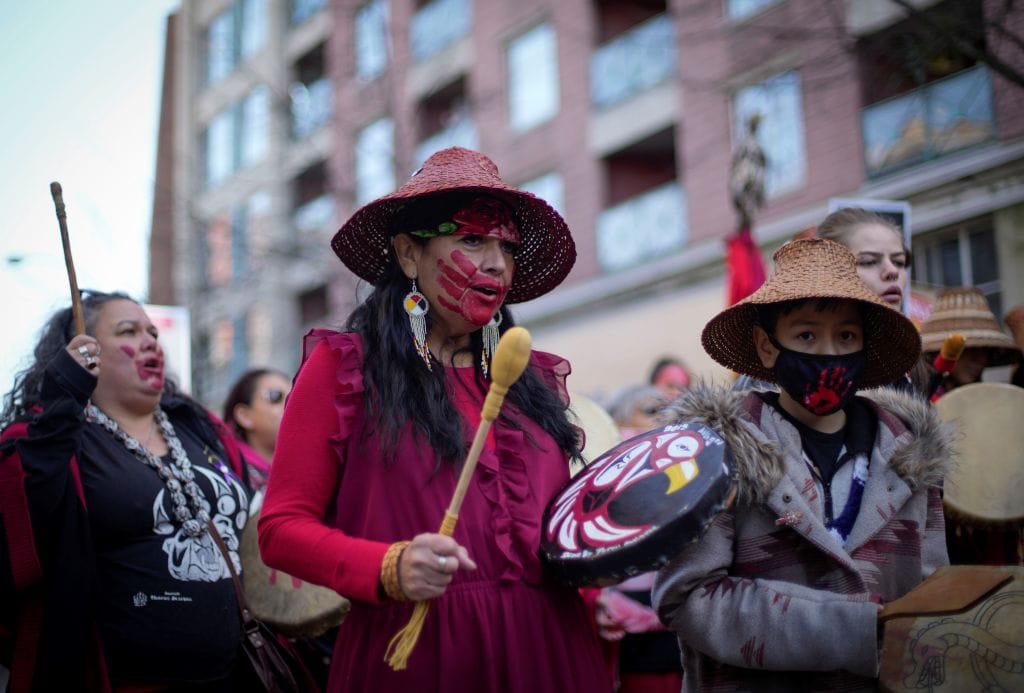
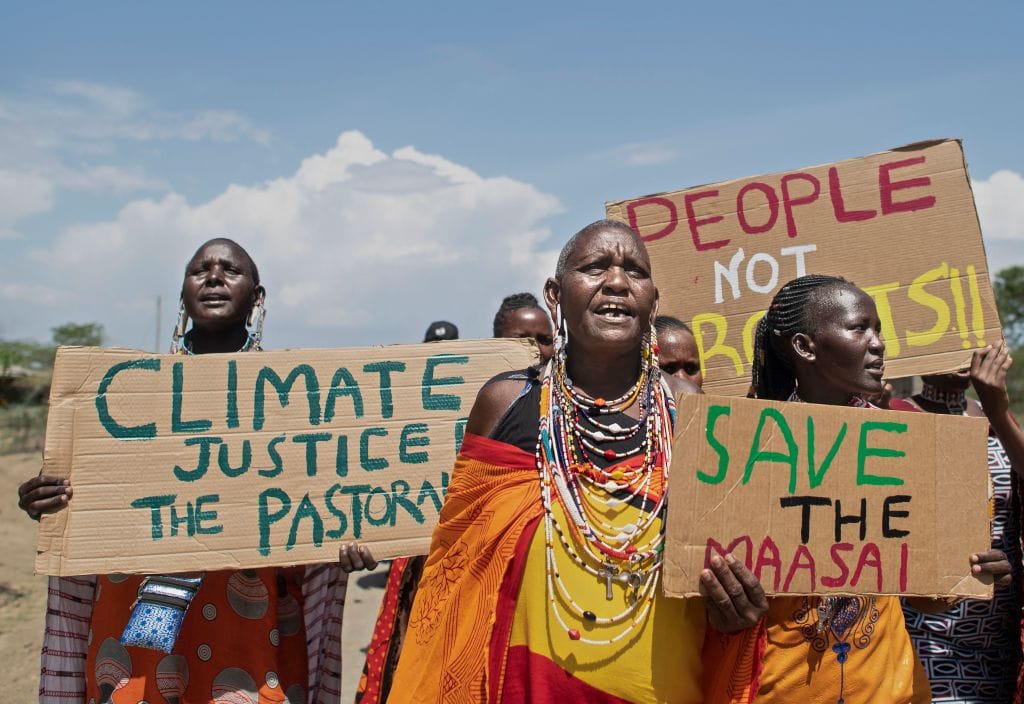
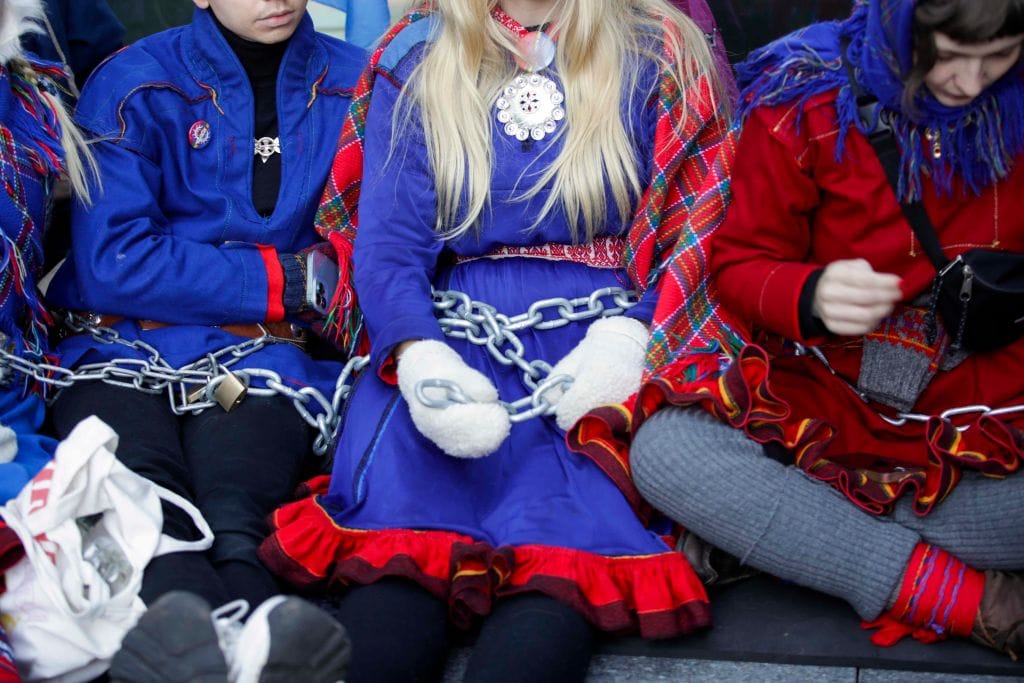
Let’s Talk About Palestine
I have saved perhaps the hardest topic for last.
I mentioned before that the word “Indigenous” is defined in the context of a global Indigenous peoples movement, allowing us to organize across borders and unite over shared experience.
And my friends, there’s a reason that by and large, when Indigenous people look at what’s happened in Palestine since 1948, we know whose experience looks the most like ours. Hint: It’s not the Israeli Jews.
We too, have been told that our lands were empty when the settlers arrived (“A land without a people…”); subjected to forced removal; murdered by armies hand-in-hand with settler posses; slandered as uncivilized, backwards, intrinsically violent; told that the elimination of our villages, towns, and cities was an accident, regrettable, inevitable—then had them rebuilt, filled with settlers, and renamed in a foreign language. We’ve had our sacred sites destroyed; our cultures criminalized; our very existence labeled an obstacle to peace and security.
When we see an Israeli state friendly with settler colonial powers like the US, Canada, and South Africa, a state happy to massacre Indigenous Guatemalans to serve its own goals, there’s a reason we don’t feel like we’re looking at Indigenous governance.
It’s not what we created the word to mean.
Yes, there are Jews whose ancestors were living in Palestine before the onset of Zionist settlement—and in some cases, perhaps even since before the Bar Kochba Revolt. This doesn't change the overall picture. Like the Algerian Jews, transformed by judicial fiat from Indigenous Algerians into French settlers, Palestinian Jews were likewise transformed with the establishment of Israeli control in 1948. Their experience, distinct as it was from that of Ashkenazi settlers, was a world away from that of [non-Jewish] Palestinians.
We know whose experience looks the most like ours.
Remember what I said about how it’s the conditions of colonialism that create the categories of settler and Indigenous? Because “Indigenous” and “settler” are not identities or awards or punishments—they’re labels describing relationships within positionalities of power.
“Indigenous” is a label created by us, for us. So the way the global Indigenous community sees this question matters, in a deep and fundamental way. It doesn’t mean we’re trying to “exclude” Jews or take something away. It means that there are many wonderful ways of being a culture and a people. Some words apply to some of those ways, and others don’t.
👉 Does this mean that all Jews have to leave historic Palestine, or that Jews have no legitimate connection with the land?
Of course not.
👉 That’s not the conversation we’re having here.
But that’s the defensive place that many Jews immediately go to—and it reveals the real reason for the “Jews are Indigenous to Israel” claim.
It’s one more attempt to establish an exclusive claim that casts Palestinians as foreign interlopers in their own land.
That’s why calling Jews an Indigenous people is so sinister. It can’t be divorced from its political context: apologetics for a settler society that, in its current form, can never find a place for Palestinians except as a perpetual enemy to be feared and destroyed.
Space for Grief … and Rebirth
Let me tell you a story. When I was in my 20s, I came across several works by North American settler rabbis about the connections between Judaism and Indigenous cultures. It was like a breath of fresh air. I felt invigorated. I felt seen. I decided this was the corner of the Jewish world that I wanted to be in.
In my 30s, I came to understand why I’d never ended up feeling safe or at home in that corner. I saw how so many of the projects founded around those ideas were erasing actual Native people, benefiting from our lands and images and all the while perpetuating white supremacy. And I felt grief.
I still feel grief, to be honest. I wish that those commonalities were enough—that things like white supremacy and settler cosmovisions didn’t have to get in the way.
For much of my life, I truly wanted to believe that Judaism was an Indigenous culture. It would certainly make my life in particular a lot easier.
But I’ve told you who my communities are, and who I’m responsible to.
Who are you responsible to?
I would argue that in Jewish thought, in Quechua thought, and in many Indigenous and non-Indigenous systems worldwide, the answer is:
all of us, human and nonhuman, are responsible to one another.
Just because “Indigenous” isn’t the right word for Jews or our relationship with Eretz Yisrael doesn’t mean there isn’t beautiful, powerful language to describe those relationships.
And there’s still plenty we can learn from and celebrate about our commonalities (and differences!) with many different kinds of peoples.
But this learning can only take place from a foundation of real relationships founded on honesty, mutual respect, and teshuvah (“repentance and repair,” as my generous host might say).
Only within such relationships can we have the hard, important conversations that will bring us to the place where phrases like “Land Back” or “From the River to the Sea, Palestine Will be Free” don’t have to trigger a terrified, defensive response—but instead can trigger curiosity, and exploration.
What does a free Palestine look like? What is life like after Land Back? Surely the people asking for these things have written about them? (8)
In Why Indigenous Literatures Matter, Daniel Heath Justice writes that one of the major questions asked by Indigenous stories is,
“How do we learn to live together?”
It’s a conversation I invite us all to be a part of. Together.
Like this? Get more of it in your inbox every week. 🌱
For free every Monday—sign up at the ‘Subscribe now’ button just below.
And if you become a paid subscriber, that's how you can get tools for deeper transformation, a community for doing the work, and support the labor that makes these Monday essays happen.
A note on the subscription model:
I want my work to be as accessible to as many people as possible, in as many ways as possible. That's why the Monday essays are free, and why we donate subscriptions to anyone for whom paying is a barrier to the House of Study posts.
I also believe people should be paid fairly for their work. Needless to say, these two values sometimes seem to be in conflict, but I do what I can to find a fair balance. I offer many resources for free, and charge for others. When you donate generously or pay at the top of our scale, that helps support the work I do, provides access for those who have fewer resources, pays for the infrastructure and the technical and practical support that it takes to do this, and helps us keep the work sustainable.
And as always, if you want in to the Thursday space but paying isn't for you now, just email support@lifeisasacredtext.com and we'll hook you up.
And if you’d like to underwrite one of these donated subscriptions, you can do so by signing up at one of the higher subscription points.
And if it resonated with you, please share this post.
Sending a big pile of blessings and goodness your way. 💕
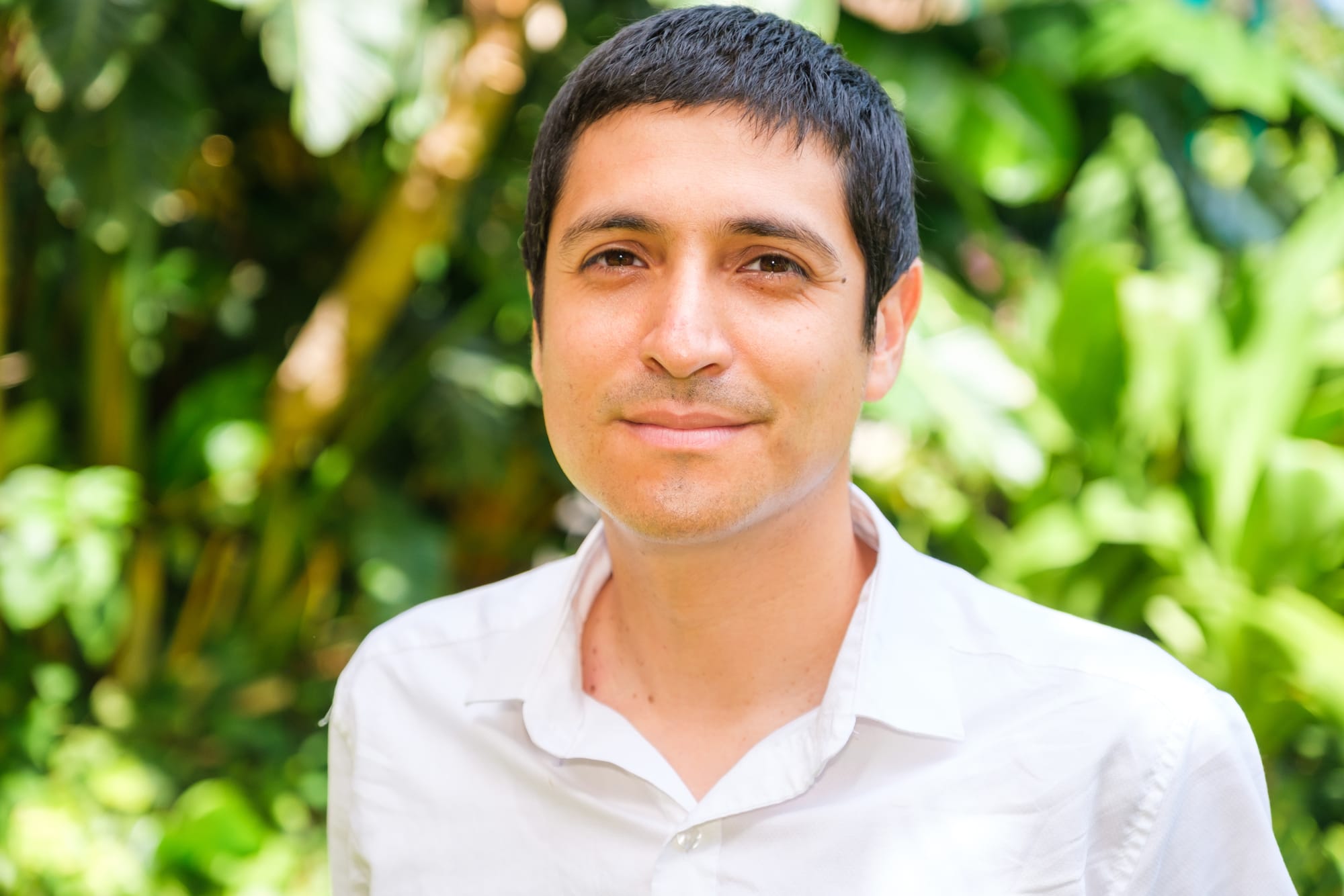
Daniel Delgado (he/him) is a Quechua and Jewish writer, editor, game designer, rabbinic student, and rabble-rouser. He is a former editor of Earth First! Journal and the author of a chapter in The Sacred Earth: Jewish Perspectives on Our Planet. His short fiction has appeared in publications including Lamplight Magazine and Cossmass Infinities. He is also a designer on Koboa, a forthcoming South American TTRPG setting. You can follow him on Bluesky or his mostly inactive Twitter.
FOOTNOTES
[1] Or bite them
[2] Ethnoreligion
[3] “Indian” was a colonial term specific to the Americas
[4] As much as we might dislike what Antiochus IV did in Judea, there are no Indigenous people in the story
[5] You still haven't defined the word "Indigenous"!
[6] I am aware of no instances in which Jews have been a colonized people
[7] One way to eliminiate Indigenous people is by assuming their identities
[8] What does a free Palestine look like? What is life like after Land Back?
Or scalp them. Which I would never do! My Native ancestors didn’t do that kind of thing—-we cut off our enemies’ heads and turned their skulls into drinking chalices. ↩︎
Wikipedia: “An ethnoreligious group … is a grouping of people who are unified by a common religious and ethnic background.” (RDR adds: Needless to say, reminder that there are Jews who were not descendants of Jews or whose Jewish parents were not descendants of Jews, and there are Jews who are not religious, and what unites us in the end ultimately is that we're a people; peoplehood isn't a Christian concept, so it's hard to explain, but there you go.) ↩︎
And, you know, India. ↩︎
You will certainly find scholars who describe peoples from this time period as lowercase “indigenous,” and hopefully you understand by now how that’s different from what we’re talking about. ↩︎
And neither has the United Nations. Anyone who says that the “the UN definition” supports their claims is trying to sell you something. ↩︎
I am not a scholar of European history, so I can’t rule out the possibility of certain Jewish-only enclaves that were subject to European-style colonization at some point. You could certainly make a strong case that European Jews lived under systems resembling apartheid in various times and places, and that these systems influenced the development of European colonialisms. But that is probably a separate conversation. ↩︎
Philip Deloria examines this history in detail in his phenomenal book, Playing Indian. ↩︎
Yes, they have! I’m particularly fond of One Country by Ali Abunimah (Palestinian) and Becoming Kin by Patty Krawec (Anishinaabe). RDR note: The wonderful Patty Krawec also has a newsletter on Ghost, to be found here.) ↩︎
A note on commenting on and sharing this piece:
I know that we’re dealing with a charged topic, so some requests to consider around commenting:
Please stick to the contents of this essay.
I know what’s happening in Gaza and Israel is heavy on everyone’s mind (it’s heavy on my own) AND there’s plenty to unpack here as it is.
If you are Jewish and having a strong reaction to this piece, maybe allow yourself to experience that emotion with curiosity. Try to remember that Daniel is both Ashkenazi and Quechua, and a subject expert on this. Consider, with empathetic curiosity, what experiences, family histories, and knowledge he might be holding that you do not have, and/or might not be able to access. Wonder what informs his opinion. If you want to argue with him, perhaps pause to wonder what feels at stake for you, given his clarity that, regardless, Jews have a legitimate connection to that land, and that we're not talking about kicking all of anybody out of anywhere. What would change if "Indigenous" weren't a label that Jews claimed?
If you’re not Jewish, please consider carefully how you share this. Please be thoughtful about framing, and remember that this thoughtful, nuanced, Jew-authored piece could easily be weaponized in antisemitic ways. I obviously think it's important work and would be glad if it would be shared, and just appreciate the extra moment of thought that might go in to considering where and how might be most constructive.
Thank you!!
